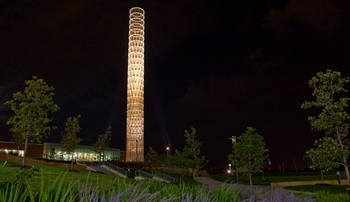This message was shared Tuesday with the UNMC community.
It was with great sadness and horrific dejà vu that we have viewed and reflected upon the events of the past week, culminating locally in the tragic loss of James Scurlock. Our condolences go out to his family as we press to move forward from this tragedy as a community.
The killing of George Floyd in Minneapolis is a tragedy that should be mourned and protested. It unfortunately also reflects the reality that broader social, economic, political and health inequities plague our society. One only has to look to the disproportionate impact of the COVID-19 pandemic on people of color across our country and community to reinforce that point.
Persons of color have faced centuries of mistreatment and subjugation across our nation, including in our own communities. It is disappointing to see how little progress has been made in the past 50 years in addressing the systemic inequities. Racism takes many forms — we witnessed in Minneapolis its most brutal form, but it extends throughout a spectrum. Racism, disproportional poverty levels, underserved communities, discrimination, differential treatment — they are part of life for persons of color.
Across the country and in our own community, citizens have risen to protest racism and violence against Black people. Instigators of violence must not derail the purpose of the justified protest. Let’s listen to Mr. Scurlock and Mr. Floyd’s families’ pleas for peaceful protest as we witness a broad coalition of people with different racial, religious and ethnic backgrounds, united in demanding a fundamental change. Civility and decency are requirements of a unified society and we must practice them in our daily interactions.
Our university community can and absolutely should exemplify what it means to stand for a better, more just world through the way we treat each other, our current and future students, faculty, staff, clinicians, patients and community members. Together, we can continue to build a space where we keep each other accountable and move toward achieving racial and social justice.
We as leaders support your involvement in our community and your advocacy for those in need. Your collective efforts can amplify the voices of suffering populations that have been silenced for far too long. Use your voice through peaceful dialogue, letters to elected officials, and through your public health work. Most importantly, vote and get engaged in the political process at all levels.
We are available to listen and discuss these issues. We want to hear your ideas and suggestions to help us fight against anti-Blackness and all forms of discrimination. You will see steps taken at the institutional level. Our students, faculty and staff will help build a better tomorrow through listening and learning from each other and following words with meaningful actions.
All of our lives have been disrupted by the COVID-19 pandemic, and we all are struggling with it. However, our colleagues and friends of color have the additional emotional toll of dealing with the burden of structural racism. We encourage you to reach out to these colleagues and listen. Ask yourself how you can become an ambassador and advocate for change. Do your part in this important transformation.
Struggling with these large issues can take a tremendous emotional toll. If you need more professional help, please take advantage of the support services available through employee and student health at UNMC’s campuses and through area providers.
Our country is going through an enormously difficult time, and we have much to think about and deep work to do to ensure equity, safety, respect and opportunity for all. People will look to us in these difficult times for examples of leadership grounded in empathy. Not only will we do this, but we are confident that we will continue to build a society based on civility.
Enough is enough. We are committed to a better and more just future.
Dele Davies, M.D.
Senior Vice Chancellor for Academic Affairs
Dean for Graduate Studies
Bradley Britigan, M.D.
Dean, UNMC College of College of Medicine
Ken Cowan, M.D., Ph.D.
Director and Physician-in-Chief, Fred & Pamela Buffett Cancer Center
Director, Eppley Institute for Research in Cancer
Janet Guthmiller, D.D.S., Ph.D.
Dean, UNMC College of Dentistry
Ali S. Khan, M.D., M.P.H.
Dean, UNMC College of Public Health
Emily McElroy, MLIS
Dean, McGoogan Health Sciences Library
Kyle Meyer, Ph.D.
Dean, UNMC College of Allied Health Professions
Karoly Mirnics, M.D., Ph.D.
Director, The Munroe-Meyer Institute
Keith Olsen, Pharm.D.
Dean, UNMC College of Pharmacy
Juliann Sebastian, Ph.D.
Dean, UNMC College of Nursing

I am grateful for this email and its entirety. I do however, have a question regarding a statement made. It was stated "Racism takes many forms — we witnessed in Minneapolis its most brutal form, but it extends throughout a spectrum."
Although what the officer did was unjust and wrong, how do we know this was race related? Are we just assuming this? I agree that violence against African Americans should be stopped and it seems to only get worse. Maybe I am missing something in articles or videos, but who decided this act was race related? Did the police officer (s) state that it was? Again, are we just assuming it was because both involved were different races?
Just a thought as our country likes to jump to conclusions based on what the media portrays.